Ramen is a favorite for lots of people because it’s easy to make, doesn’t cost much, and just makes meal times more fun. Whether you’re whipping up a quick bowl of instant ramen or enjoying a delicious, carefully made bowl at a Japanese restaurant, ramen is something many of us love. It might be the food you reach for when you need a little comfort at home, a flashback to those college days when you needed something cheap and tasty, or just a way to enjoy a good, hearty broth with soft noodles.
But you might wonder, are ramen noodles bad for you? If you’re interested in finding out how ramen can be part of eating healthy, keep reading this article by DietHCG.
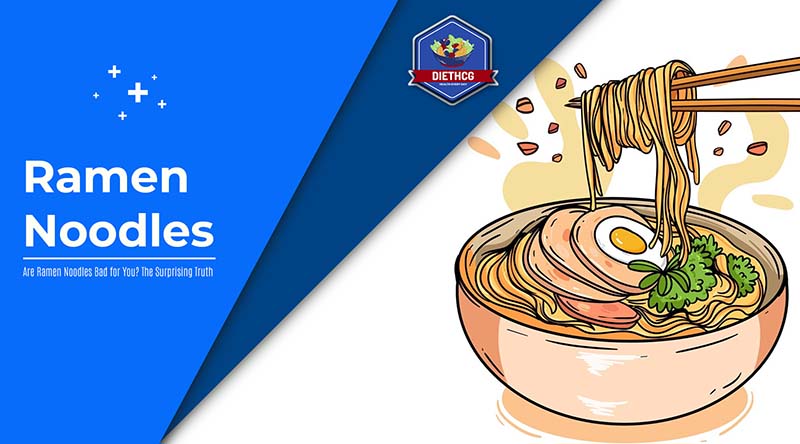
1. What Are Ramen Noodles?
Ramen is a type of Japanese noodle soup that actually started in China before becoming a big part of Japanese cuisine in the late 1900s. After World War II, Japan faced a tough time with very little rice and food available, which made ramen, a noodle made from wheat flour, very popular. Ramen stalls began popping up everywhere, and each area in Japan had its own unique version of this favorite street food. In 1958, a big change happened when Momofuku Ando, the man behind Nissin Foods and of Taiwanese-Japanese heritage, created instant ramen. This new quick and easy ramen spread its fame all around the world.
At its simplest, ramen is a bowl of noodle soup made with Chinese-style wheat noodles, a flavorful broth, and various toppings. Instant ramen comes as a block of noodles that are either flash-fried or air-dried, along with a packet for flavor and some dried toppings. You just add boiling water to cook it all up.
The noodles in ramen are made from wheat flour, water, salt, and something called kansui, which is an alkaline water. Kansui is what gives ramen noodles their bouncy, chewy texture. These noodles can be all sorts of shapes and sizes, from thin to thick and from straight to wavy. The noodles in instant ramen are usually flash-fried, which keeps them good on the shelf for a long time and lets them cook up fast.
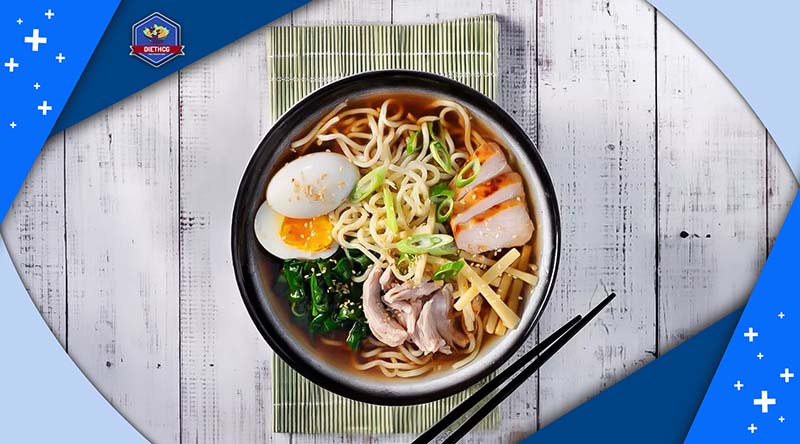
2. Nutritional Composition of Ramen Noodles
Most instant ramen noodles are low in calories yet lack many important nutrients.
Take, for example, one serving of Momofuku Tingly Chili Noodles (95g) which provides:
- Calories: 300
- Total Fat: 1g
- Saturated Fat: 0g
- Protein: 11g
- Total Carbohydrates: 63g
- Total Sugars: 5g
- Added Sugars: 3g
- Fiber: 2g
- Sodium: 1400mg
These noodles are made from wheat flour that’s been enhanced with man-made forms of certain nutrients like iron and B vitamins to boost their nutritional value.
However, they lack crucial nutrients, including protein, fiber, vitamins A and C, vitamin B12, calcium, magnesium, and potassium.
Moreover, packaged foods like instant ramen don’t offer the antioxidants and phytochemicals found in whole, fresh foods, which are vital for our health.
They also have a lot of calories but don’t provide the variety of nutrients you’d get from a more balanced meal with protein, veggies, and complex carbs.
Though a single serving (43 grams) of ramen contains just 188 calories, many consume a full package, doubling the calorie intake to 371.
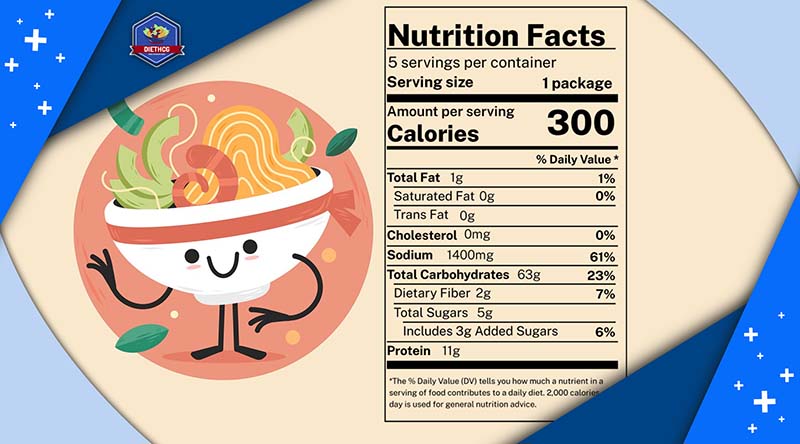
3. Are Ramen Noodles Bad for You?
Ramen noodles, particularly the instant varieties, often get flagged as unhealthy due to several factors:
- Lack of Essential Nutrients: Instant ramen noodles are quick to prepare because they are pre-cooked through steaming and then either air-dried or fried. Despite being made from wheat flour that’s fortified with certain nutrients like iron and B vitamins, they fall short on delivering essential nutrients your body needs. This includes protein, fiber, vitamins A and C, vitamin B12, calcium, magnesium, and potassium. Additionally, they don’t contain the antioxidants and phytochemicals found in fresh foods, which support various health benefits. Plus, they’re calorie-rich but nutrient-poor.
- High Sodium Content: Sodium is crucial for your body’s normal operations, but too much of it, especially from processed foods like instant ramen, can be harmful. High salt intake is linked with increased risks of stomach cancer, heart disease, and stroke. Certain individuals may experience heightened blood pressure from a high-sodium diet, adversely affecting heart and kidney health. Despite ongoing debates about the recommended daily sodium intake, it’s universally agreed that consuming less salt is healthier. Instant ramen is particularly high in sodium, making it challenging to maintain a low-sodium diet if consumed regularly. This is problematic for those relying on ramen as an easy meal option, potentially leading to excessive sodium intake.
- Presence of MSG and TBHQ: Many processed foods, including instant ramen, contain flavor enhancers like monosodium glutamate (MSG) and preservatives such as tertiary butylhydroquinone (TBHQ). TBHQ is used to prolong shelf life but has been linked in animal studies to various health issues, including nerve damage and potential risks of lymphoma, as well as organ enlargement. There have also been reports of vision disturbances in people exposed to TBHQ, and some studies suggest it might damage DNA. MSG, another common additive, can cause adverse reactions in some individuals, such as headaches, nausea, and increased blood pressure. While these ingredients are considered safe in small quantities, their presence in instant ramen can be a concern, especially for those sensitive to food additives.
In summary, while the occasional bowl of instant ramen is unlikely to harm you, relying on it as a dietary staple without balancing it with nutrient-rich foods can lead to health issues. For those particularly sensitive to additives like MSG, it might be wise to limit consumption of instant ramen and similar processed foods.
4. Should You Avoid Eating Ramen Noodles?
While enjoying instant ramen noodles once in a while is unlikely to negatively impact your health, making them a frequent part of your diet can lead to a decline in diet quality and various health issues.
Research involving 6,440 adults in Korea revealed that those who often ate instant noodles consumed less protein, phosphorus, calcium, iron, potassium, niacin, and vitamins A and C than those who didn’t eat instant noodles. Additionally, the frequent noodle eaters tended to eat significantly fewer vegetables, fruits, nuts, seeds, meat, and fish.
Moreover, eating instant noodles regularly has been linked with a higher risk of developing metabolic syndrome. This condition is characterized by a cluster of symptoms, including increased belly fat, high blood pressure, elevated blood sugar, and abnormal cholesterol or triglyceride levels.
Therefore, it’s advisable to moderate your intake of instant ramen noodles and avoid relying on them as a staple meal. Incorporating a variety of nutrient-rich foods into your diet is a healthier choice.
5. Healthy Ways to Eat Ramen Noodles
If you’re a fan of instant ramen noodles but want to enjoy them in a healthier way, there are several strategies you can employ:
- Add Vegetables: Enhance your ramen with fresh or cooked vegetables such as carrots, broccoli, onions, or mushrooms. This not only adds essential nutrients missing from plain ramen noodles but also boosts the meal’s fiber content, contributing to better digestion and satiety.
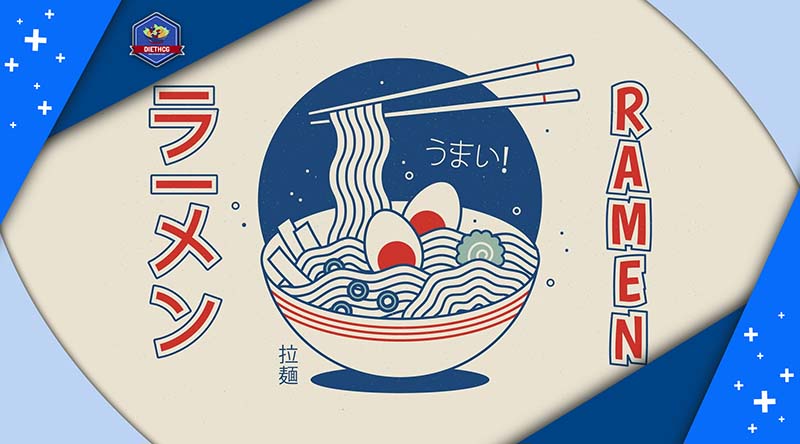
- Pile on Protein: Instant ramen noodles don’t offer much protein, a key nutrient for muscle repair and growth, and keeping you feeling full. You can increase the protein content by adding eggs, chicken, fish, or tofu to your ramen, making it a more balanced meal.
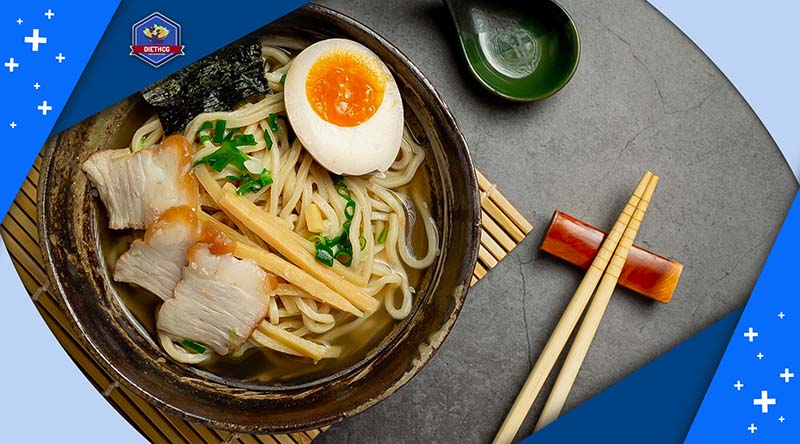
- Choose Low-Sodium Versions: Look for instant ramen options that are labeled as low-sodium. These products contain less salt than their regular counterparts, helping you manage your sodium intake better.
- Ditch the Flavor Packet: Instead of using the high-sodium flavor packet that comes with instant ramen, try making your broth. You can use low-sodium chicken or vegetable stock and season it with fresh herbs and spices to taste. This way, you control the sodium level and avoid unnecessary additives.
6. Frequently Asked Questions
How Do Instant Noodles Affect Health?
Instant noodles, including ramen, are not inherently unhealthy, but the flavor packets that come with them are often high in sodium. A diet rich in sodium can increase the risk of high blood pressure, which is a leading cause of stroke and heart disease, as stated by the Centers for Disease Control and Prevention (CDC). You can reduce the sodium content of ramen by using less of the flavor packet or by not consuming all the broth.
Is It Safe to Eat Ramen Noodles Every Day? How Often Should You Eat Ramen?
Eating ramen noodles every day is not advised due to their high sodium levels and lack of essential nutrients. Particularly, instant ramen can contribute to health issues like metabolic syndrome and heart disease because of its processed nature, high saturated fats, and sodium. Eating them regularly can lead to an excessive intake of sodium, negatively affecting your health. It’s recommended to enjoy instant ramen in moderation, opting for healthier versions like fresh ramen loaded with vegetables, lean proteins, and low-sodium broth when possible. While having ramen occasionally is fine, eating it too often can deteriorate your diet quality and overall health. Balance and variety in your diet are essential for maintaining good health.
Are There Any Healthier Alternatives to Ramen Noodles?
The main concerns with instant ramen are its high sodium content and poor micronutrient profile. Yet, there are healthier alternatives available on the market, including low-sodium options. Brands such as Momofuku noodles (by Chef David Chang) and the Saucy Noodle line from Omsom (an Asian-owned brand) offer such alternatives. Notably, the Momofuku noodle line uses A-Sha noodles, which are air-dried instead of flash-fried, making them a healthier option compared to the typical instant noodles. These alternatives provide a way to enjoy the convenience and taste of ramen without the unhealthy downsides.
7. Conclusion
Ramen noodles offer a comforting, carb-rich meal that’s both wallet-friendly and easily accessible, making them a popular choice for quick dining options. While it might raise the question, “Are ramen noodles bad for you?”, it’s important to note that instant ramen itself isn’t inherently harmful. However, relying on it exclusively for daily meals or consuming it multiple times a day is not advisable primarily because of its high-sodium content found in the flavoring packets and broth. To boost the nutritional value of ramen, consider enriching it with additional toppings like proteins and vegetables.
This approach not only enhances the flavor but also improves the overall nutritional profile, transforming a simple bowl of wheat noodles and broth into a more balanced and nutritious meal.


